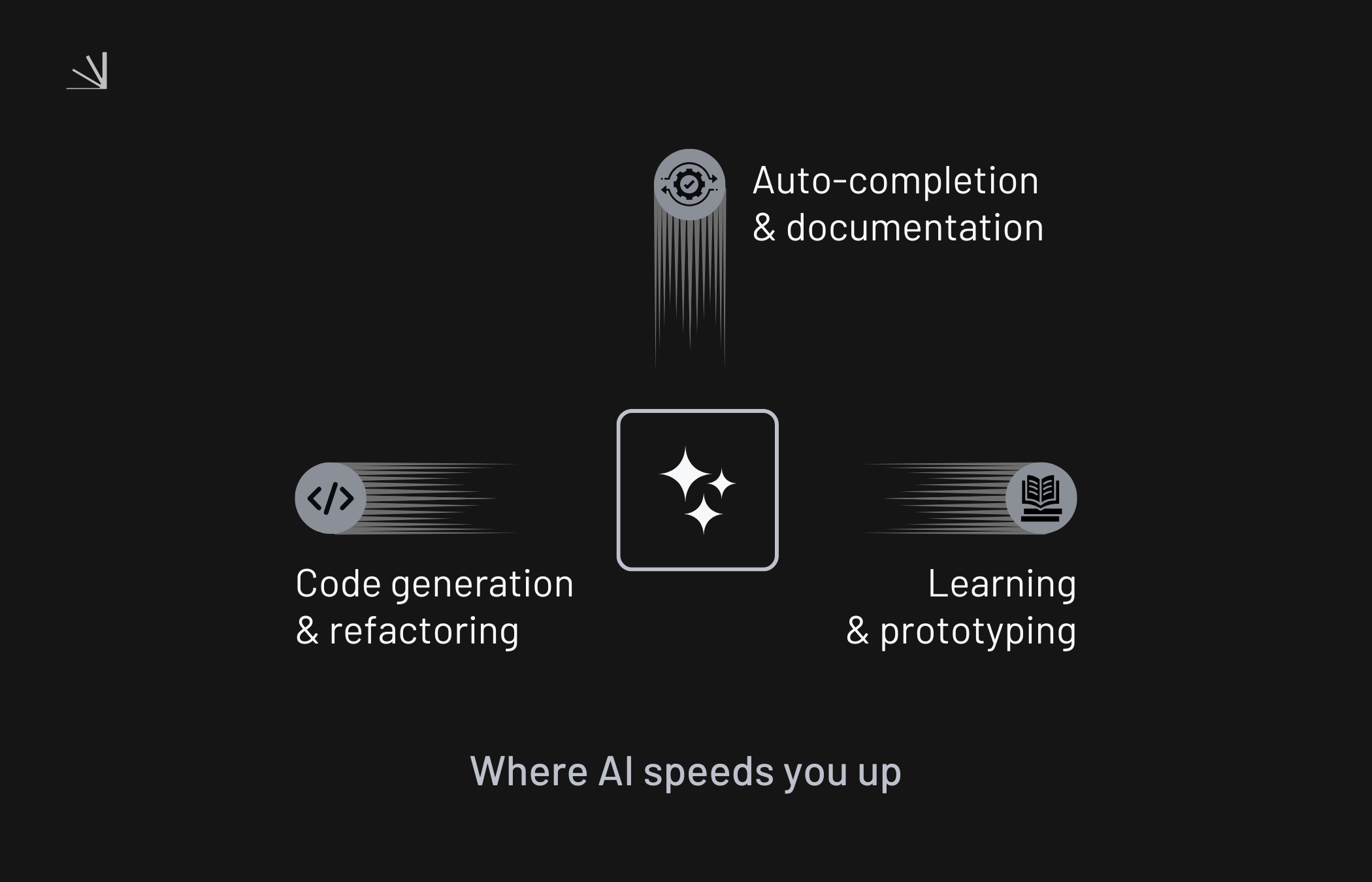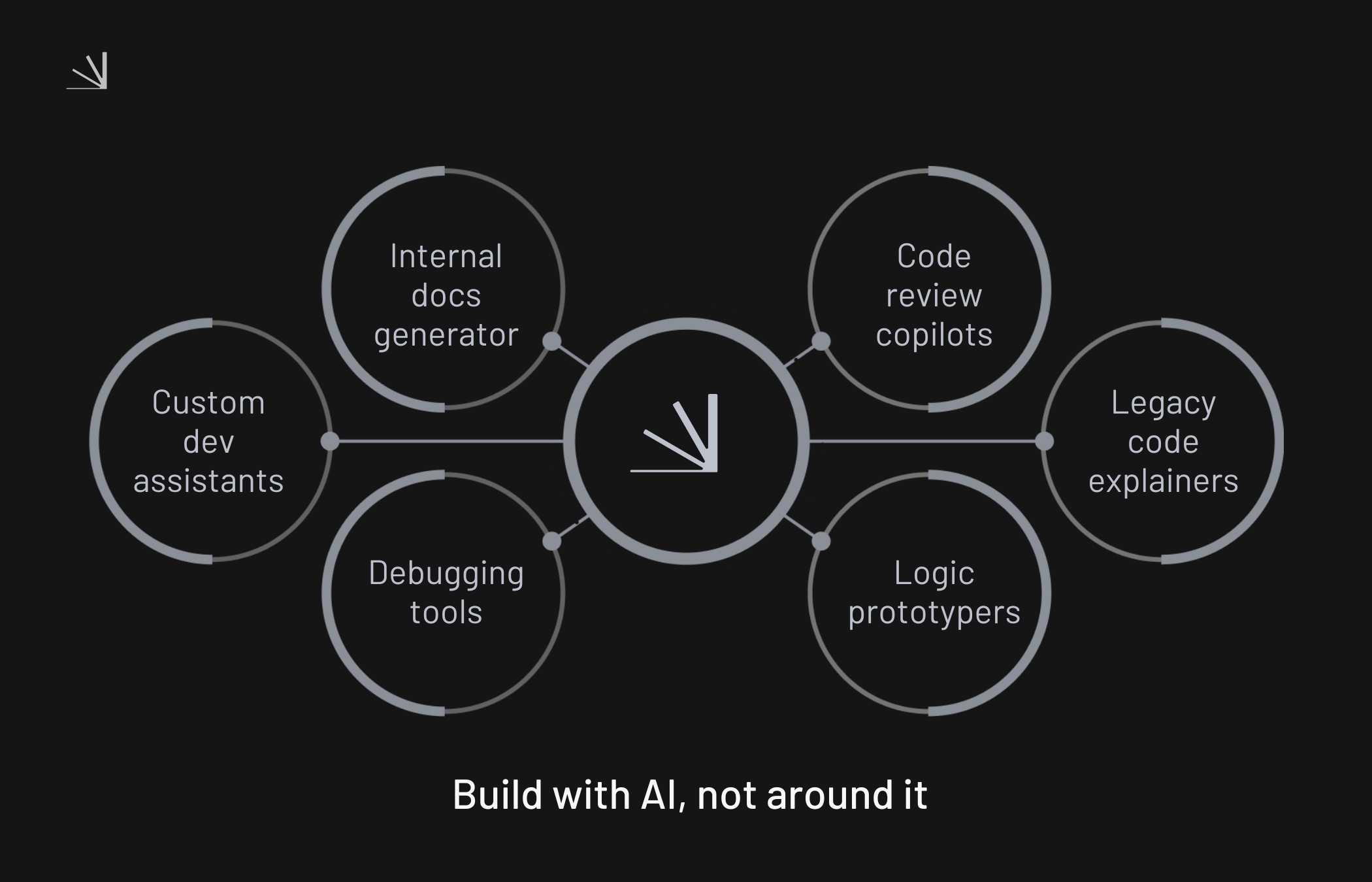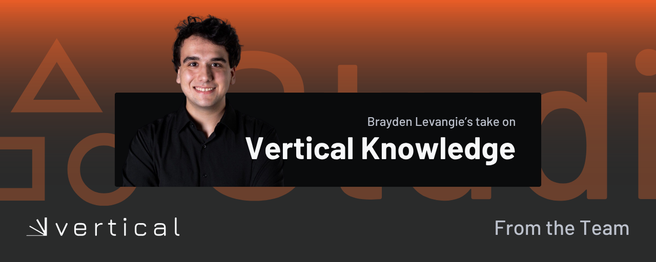Will AI replace developers?
Published on July 29, 2025 · 5 min read

Will AI replace developers? Why that’s the wrong question
“AI won’t replace you. A person using AI better than you will.”
This widely shared quote captures a growing sentiment with developers, and professionals from all other industries.
AI is rapidly changing how software gets built. Tools like GitHub Copilot, ChatGPT, Deepseek, and Claude are advancing in their ability to write code, suggest architecture, and even identify bugs. It makes sense that you have come to this article and people are asking, “Will AI replace developers?” But that question misses the bigger picture.
AI still has real limitations. It doesn’t understand context like a human, it can’t weigh business trade-offs, and it generally relies on patterns rather than logic. Rather than replacing developers, it empowers those who know how to use it.
At Vertical, we believe AI won’t replace developers or development as a whole. Instead, it will reshape the industry. Those who move from users to creators will be the ones shaping what comes next.
Who gets replaced: The programmer or the prompt engineer?
The question isn’t whether AI will replace developers, but whether developers will fall behind those who learn to use it more effectively.
This shift in thinking is important. The difference between a good developer and a great one has never been about writing more lines of code. It’s about problem-solving, understanding systems, navigating constraints, and delivering practical solutions. Those qualities still matter. They always will.
Throughout the history of software development, new tools have continually reshaped how we build. From compilers to frameworks to cloud platforms. And each time, developers who adapted stayed relevant and competitive. AI is simply the next evolution in that pattern. Once again, those who know how to work alongside new advancements will move faster and build smarter.
We’re already seeing this in practice. AI is used to generate boilerplate, assist with documentation, and speed up early prototyping. This is not AI acting on its own. It's developers learning to adopt and guide AI effectively.
Where AI adds the most value for developers
AI tools have become valuable coding assistants, speeding up repetitive tasks and helping developers focus on complex problems. They don’t replace human thinking but streamline many daily activities.
Code generation and refactoring: Quickly produces boilerplate code, suggests improvements, and cleans up legacy code, saving time on routine work.
Auto-completion and documentation: Predicts and completes code snippets, generates inline documentation, and helps keep code consistent and readable.
Learning and prototyping: Lowers barriers for beginners and experts exploring new frameworks by enabling fast idea testing and suggesting design patterns.

What to expect in the coming years
AI development is advancing rapidly, with new capabilities emerging that will further assist developers in handling more complex tasks. These improvements will not only enhance productivity, but also expand the ways AI can support development workflows.
Smarter debugging: AI may help detect more complex bugs and offer more precise fixes.
Collaborative coding: Greater integration into team workflows to assist with code reviews and aligning technical work with project goals.
Customizable assistants: More tools that developers can tailor to their specific projects for better context awareness.
Vertical AI implementations: Fine-tuned models for specific industries or tasks, helping developers build specialized apps more efficiently.
What AI cannot do (yet)
AI is powerful, but still lacks the judgment, empathy, and insights that make great developers. It pattern-matches from data, but doesn’t think holistically or weigh trade-offs. This limits its role in strategic and collaborative parts of development.
Understanding stakeholder goals: AI can’t join meetings or grasp the nuance behind business needs. Translating vague requirements into solutions requires human insight and communication.
Finding and solving complex bugs: AI handles simple errors well, but struggles with complex, cross-system bugs that require deep contextual understanding and intuition.
Making trade-off decisions: Choosing between speed, scalability, or cost depends on priorities and goals. Factors AI can’t evaluate meaningfully.
Designing long-term systems: Architecting scalable, maintainable platforms requires foresight and prioritization AI can’t provide.
Communicating across teams: Collaboration, negotiating, aligning and clarifying are key to software success. AI does not have the social skills and nuance needed.
AI as a tool vs. copy-pasting AI output
Knowing what AI can do is essential, but just as important is knowing what not to use it for. It’s an easy pitfall to ask the AI for basic or even more complex coding and then copy pasting the output. But not everyone can assess whether that code is correct, secure, or even solving the right problem.
There’s a risk in treating AI like a magic box: garbage in, garbage out. Weak prompts produce weak results. Blindly trusting AI output can create more problems than it solves.
Prompting well is a human skill. So is knowing when to question or ignore AI suggestions. Developers who master both can unlock far more than auto-generated code. They can use AI to design better, faster, more aligned solutions.
Think of AI like a calculator. It is only as right as the input you give it. If you put in the wrong numbers or apply the wrong formula, you will get a technically correct answer. However, it’s the solution to the wrong question.
How developers can future-proof their careers
As AI evolves, so does the role of the developer. Workflows are changing, but human skill remains at the core. Here’s how to stay ahead:
Master AI: Learn prompt engineering. Explore AI-assisted testing, code review, and documentation. The better you understand what AI can do and how to use it, the more effective you become.
Work on your soft skills: Collaboration, stakeholdermanagement, and empathy will always set great developers apart.
Become an expert: Whether it's backend architecture, DevOps, or a specific industry, specialization creates value.
Build with AI, not just use it: On platforms like Vertical, you can fine-tune models, create AI-powered tools, and publish them. That’s not just using AI, you actively work on the development.
Vertical’s role in the future of AI and development
Vertical is a platform where developers don’t just adapt to AI, they shape its future.
With our no-code studio, you can fine-tune powerful AI models for a wide range of tasks. Not just code generation, but also legal automation, customer support, content creation, and everything in between. Whether you’re building a custom chatbot or a debugging assistant for a specific tech stack, Vertical gives you the tools to create AI that fits your needs. Build AI tools tailored to real development needs, such as:
Auto-generating internal documentation
Creating custom developer assistants
Building domain-specific debugging tools
Developing code review copilots tailored to your stack
Training models to explain legacy codebases
Prototyping tools that translate business logic into working code
 You can work on your own models, but also use ones created by others. Our credit-based marketplace makes it easy to discover, use, and benefit from specialized tools built by the community.
You can work on your own models, but also use ones created by others. Our credit-based marketplace makes it easy to discover, use, and benefit from specialized tools built by the community.
Will AI replace developers? The answer is no, but the role will change
AI won’t make developers obsolete. Instead, it will redefine what it means to be a developer. Those who learn to work with AI will lead the future of software development, creating new opportunities and possibilities.




